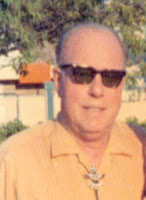A TRAVELING SALEMAN
Sometimes you learn things from relatives only after they have died. Ones your parents told you that you should get to know, but never did.
All I really knew about Uncle Wes was he traveled the entire country as a salesman of small leather goods, men’s accessories like wallets and key chains. Ones he manufactured, selling them to variety, clothing, and hardware stores, mainly in small town America.
He and his wife Louis had a grand house on a hillside in Oakland where you could look out on the majesty of San Francisco’s skyline and the Bay bridge. In winter, Wes manufactured his products in the basement. Family rumor had it that Louis came from a monied family, the source of their wealth.
My parents sent me there on school breaks to help him with manufacturing. The wondering imagination of a young boy looking out on what seemed like the whole world at the time. Even then, Wes would spin his tales of people he met on the road and wisdoms he learned. He took pride in fashioning things from seemingly cast off material and found objects. On one of the exotic trips abroad he and Louis would take, he discovered heart shaped nuts a tribe considered magical. He bought as many as he could, polishing and weighting them. They became just another items he could sell.
In the evening he would show slides of there trips. As in all, his inventor mind shown through. He had fashioned a special brace for his camera which looked like a rifle stock. I laughed about this in later years, thinking he would probably have been shot now given the fright of mass shootings and guns.
Wes and Louis would take off on the first day of Spring in their Ford Mercury station wagon with wood paneling, called a “Woodie.” They drove all the way across country stoping at every town, most you never heard the name of. Each seemed to have a hardware store or mens clothing store with a rack called “Cooks,” displaying Wes’s wallets and key chains. They would always stop at my parents place in Oregon. I remember Wes always setting up the infamous slide projector to show his photos, each memory treasured and shared. He cared for things including the Woodie. Each evening before supper he would spend time polishing and cleaning off the days road dirt.
Even on my travels, on rare occasion, I would still find one of those cardboard “Cooks” stands languishing in the back of a store, pausing for a moment to remember.
Years went by, I’d heard Louis had died. Wes seemingly disappeared after that. I knew not of his whereabouts or endeavors. I rarely thought of my experience with them. His memory becoming just a faded photo. When I did remember, Wes’s passion for life and learning about people flowed back into my thoughts. It seemed you never had the luxury of deep understanding of people now.
So it came as a surprise when I got a call from Carl Paul, an attorney in Palm Springs. He seemed in a hurry getting right to the point, “Wes Cook, your uncle had died and having no other relatives, left you the balance of his estate. There is a small amount of cash, but the main asset is his small FM radio station, it’s called Eagle Mountain 106.7. He lived in a back room there. The place is miles from anywhere out in the desert. It shut down after Mr. Cooks death. If you want to dispose of that, I may have a buyer.”
Paul went on, “I don’t know what you would really describe the radio station as. I guess it is a cross between advice and a bit of religion thrown in. Mr. Cook would take calls from all over the country, ones telling of peoples plights and lives. He would offer some home spun advice. Anyway, as I said I am not sure. The listening audience from what I have learned is small.
The only thing I know is that he bought the station seven years ago after selling his manufacturing business. As I said, I have a buyer for the station if you want to dispose of it.”
I didn’t reply. Shocked at hearing all this. I looked out the window of my Seattle office, rain was falling. It had for weeks. Business had been tough, everyone fighting to keep the business they had. Management which used to be a prize now seemed boiled down to “riding the horses and firing the dogs.” I took little pleasure in what the next weeks held.
Mr. Paul ask, “Are you still on the line?”
Without thinking, I said, “I’d like to see the station.”
The next day, I was on a plane to Palm Springs. I had no idea what I would find at the station. Maybe that old projector or some other mementos from Wes’s life. Maybe notes on why he ended up there. I wondered if the station could be started again, if there were tapes or an autostart feature.
Most of all though, maybe it was a last chance to know Wes, maybe even myself.

Comments
Post a Comment